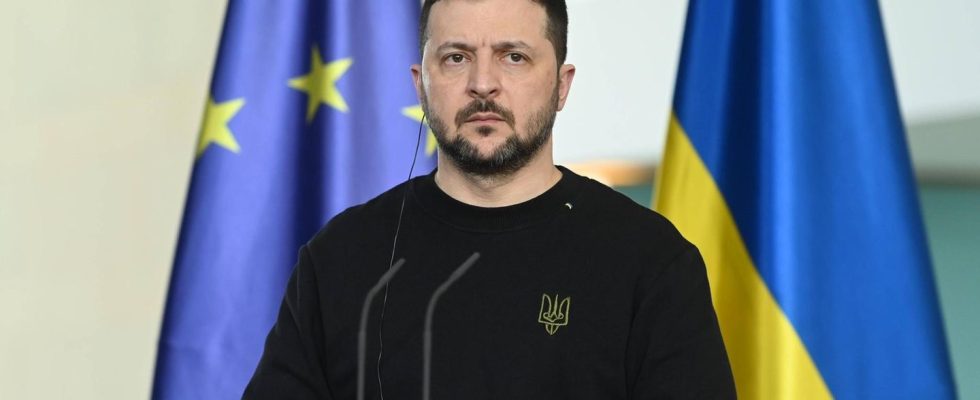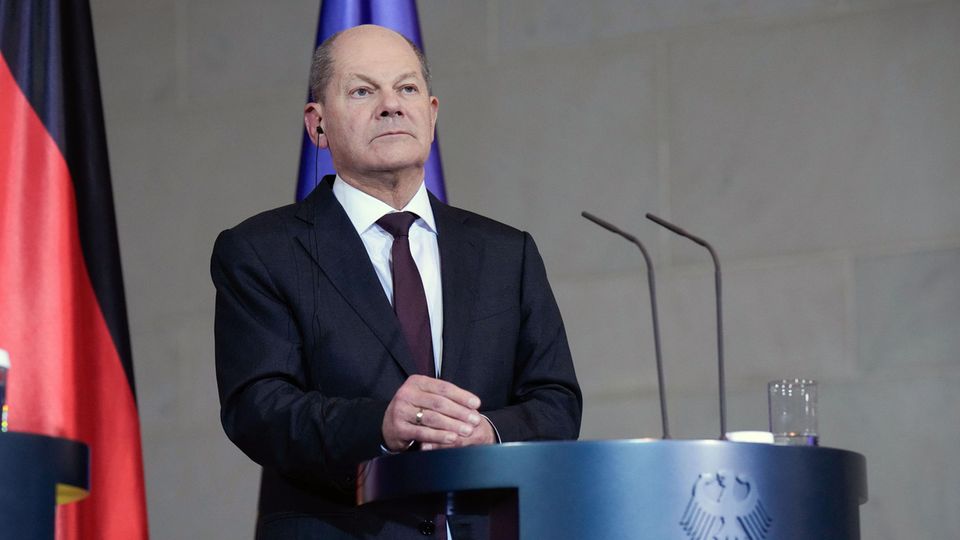Ukrainian President in Berlin
Zelensky’s visit to Scholz: “Nawalny was murdered – like thousands of others”
Watch the video: Russian justice system – Kremlin critic Navalny dies in custody.
The leading Russian opposition politician Alexei Navalny has died in custody, according to the judiciary. This was announced by the prison administration, as reported by the state agency Tass. The 47-year-old is said to have collapsed on Friday after a walk in his Siberian penal colony. Attempts at resuscitation by paramedics were unsuccessful. Navalny’s team said it had not yet received any confirmation of the opposition figure’s death. Navalny was sentenced to a total of 19 years in a camp for alleged “extremism,” among other things. Internationally, however, the politician, who narrowly survived an assassination attempt with the nerve agent Novichok in 2020, is classified as a political prisoner. Human rights organizations have long called for Navalny’s release.
The news of the death of Kremlin critic Alexei Navalny bursts into the middle of Volodymyr Zelensky’s visit to Berlin. For the president and his host Olaf Scholz, it proves the brutality of Vladimir Putin’s regime.
The news reached Olaf Scholz and his guest around 12:30 p.m. After an initial conversation, the Chancellor and Ukrainian President Volodymyr Zelensky have just signed a security agreement between the two countries. Friendly smiles, handshakes, satisfied faces also from Annalena Baerbock and Boris Pistorius, whose ministries prepared the contract. The delegations then retreat via a stone staircase in the Chancellery for further discussions. During this interruption comes the news of Alexei Navalny’s death. It immediately overshadows this visit.
Later, when Scholz and Zelenskyj appeared in front of the press, the Chancellor was the first to speak about the news of his death. Scholz says he met Navalny when he was recovering from a poison attack in Berlin in August 2020. At that time, Chancellor Angela Merkel ensured that Navalny could be treated at the Charité and then stay in Berlin for a few weeks. There was also talk about the great courage, Scholz remembers of his encounter with the Kremlin critic, which Navalny had to muster in order to go back to Russia. “And he has probably now paid for this courage with his life,” says the Chancellor.
“Tortured to death because of a man”
At least now we know exactly “what kind of regime this is,” says Scholz, referring to Vladimir Putin’s Russia. “Anyone who expresses criticism and advocates for democracy must fear for their safety and life.” It is a terrible sign of how Russia has changed: According to the Chancellor, after “unfortunately hopeful signs that have been around for a long time,” Russia has “no longer been a democracy for a long time.”
Dead Kremlin critic
Alexej Navalny – Pictures from a life in resistance
Zelenskyj doesn’t mince his words either. “Very regrettable,” according to the official translation, is Navalny’s death in a Russian prison. It is “obvious” to him, says the Ukrainian president: “He was killed, like other thousands who were tortured to death, because of this one person,” said Zelensky, referring to Putin. It doesn’t matter who dies, he doesn’t change his position. “That’s why he should lose everything.”
Scholz and Zelenskyj — the relationship has changed
This is, so to speak, the transition to Russia’s war against Ukraine and thus the actual reason for Zelensky’s visit to Berlin – the third during his time as president, the second since the Russian attack two years ago. The relationship with Germany was initially strained because of Germany’s Russia policy during the time of Angela Merkel, which Olaf Scholz also supported as Vice Chancellor and which Selenskyj also made in public statements for a while partly responsible for Russian aggression. But the relationship has changed.
After the USA, Germany is now Ukraine’s second most important supporter, both financially and militarily. The Chancellor estimates the military support that has been provided so far and that is planned for the future at a total of 28 billion euros. Six billion euros of this in 2024 alone. On this day in Berlin, Ukraine receives commitments to deliver wheeled howitzers, 120,000 rounds of artillery ammunition and air defense instruments worth more than a billion euros. Germany will continue to support Ukraine for as long as necessary, that’s what he always said, said Scholz – “as long as it takes”.
Despite the critical situation at the front, the Chancellor interprets the situation as positive overall: Putin has achieved “not a single one” of his war goals, says Scholz, and finds warm words for the “heroic fight” of the Ukrainian people. The spirit of resistance is “admirable.” Zelenskyj, in turn, is full of thanks to the federal government, but also to the Germans as a whole. His country needs the artillery ammunition “urgently” and the air defense systems “desperately,” says Zelensky. There is a decline in support from some partners, says the president, without being specific. That’s why German support is “vital for us.” Germany is a “leader in air defense” and that has already saved many lives. There is no mention of additional demands in the press conference, and the word Taurus – the cruise missile that Scholz stubbornly refuses to deliver – is not mentioned.
Chancellor sees “crystal clear message” to Putin
The agreement that both signed on that day is primarily intended to provide long-term support. It is based on an agreement between the G7 states on the sidelines of the last NATO summit in Vilnius. A total of 20 countries have now completed this. After Great Britain, Germany is the second country to conclude a concrete agreement with Ukraine. In the evening, France followed with a similar agreement.
Putin is sticking to his “merciless war goals,” says Scholz. That’s why they’re relying on the “crystal clear message” to the Russian president: “We continue to stand firmly on Ukraine’s side.” Zelensky puts it this way: Ukraine has never had stronger documents of support “than the ones we signed today.”



